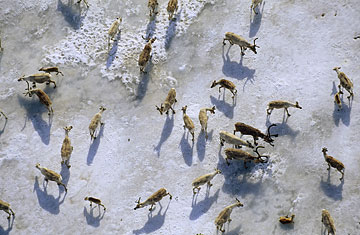
A caribou herd on the tundra
(2 of 3)
There's a lot more crude out there. An estimated 27 billion barrels of oil are believed to lie beneath the state's southwestern Bering Sea and the ice-choked Chukchi and Beaufort Seas off Alaska's North Slope. But are Americans willing to pay the price to get it? Drilling offshore in these wild waters poses an environmental risk. A loose coalition — greens who fear for endangered species like the polar bear, fishermen who worry about what another major spill could do their livelihood, Alaskan natives defending their traditional lifestyle — is fighting to keep offshore oil off-limits. It's a battle, fought from the tundra of the North Slope to the federal courts of Washington, for the future of the state — and with 13% of the world's remaining undiscovered oil believed to lie in Arctic regions, it's a battle that will likely be waged again and again in the decades ahead as the global economy moves from an era of abundant oil to one of relative scarcity. "We know from the legacy of the Exxon Valdez what's at stake here," says Rick Steiner, a marine conservationist with the University of Alaska. "The Arctic is going to be a very interesting place from now on in."
Oil on the Rocks
I'm flying over bristol bay in south-central Alaska in a six-seat Piper Aztec E, and am trying very hard not to throw up. The wind buffeting our plane gusts at over 37 m.p.h. (60 km/h) — which the pilot Theo Colson explains "is really nothing around here." Fed by the rich waters of the Bering Sea, Bristol Bay is the most valuable commercial fishery in the U.S., producing more than $2 billion annually in king crab, herring and salmon. Northern right whales and other rare marine mammals depend on the bay; passing over one stretch of coastline we see a herd of walruses a thousand strong. As we near our destination, a former Air Force base named Cold Bay, Colson points out the expanse of churning water that the U.S. Department of the Interior aims to lease for offshore oil-and-gas development. Like most people in the Bristol Bay area, Colson is a part-time fisherman and he worries that a spill, or just the impact of new oil-and-gas production infrastructure, could damage the fish. "Oil is the biggest concern in our minds," says Colson. "One weak link could bring this whole area down. I'm not an environmentalist, but I do give a s___ about the land."
Over 800 miles (1,300 km) away in the town of Barrow — the northernmost point in the U.S. — Edward Itta holds the same concerns, though he expresses them less scatologically. Itta is the mayor of the North Slope Borough, a 88,750-square-mile (142,000 sq km) stretch of tundra hard by the iceberg-laden Beaufort Sea. They've long welcomed oil development on the North Slope — the Prudhoe Bay field is 200 miles (320 km) east of Barrow — and revenue from fossil-fuel development has supplied what would otherwise be economically barren towns and villages with modern hospitals, SUVs and satellite TVs. The Inupiat natives, who make up most of the 8,000 people who live on the North Slope, have inhabited this region for thousands of years, and they still practice a traditional way of life that centers on semiannual hunts for bowhead whales. The ocean is their garden, the saying goes, and many Inupiat fear that putting clanging, dirty oil rigs in the Chukchi and Beaufort Seas will drive away the whales and destroy what's left of their culture. "A risk to the whale is a risk to us," says the soft-spoken Itta. "This has been too much, too soon, too fast."
The Inupiat and the fishermen of Bristol Bay fear offshore oil development would inevitably lead to a spill, and that cleaning it up would be virtually impossible. They remember the assurances that Exxon gave to the people of Prince William Sound that such a thing was unlikely to happen, and they remember the sluggish, confused cleanup effort, the years of bad fishing returns and the nightmarish images of oil-coated beaches. Cleaning up a spill is harder in cold water — the oil disperses much more slowly — and organizing a rapid response to a major accident in the remote Arctic would be like nothing the industry has faced. "I've been on icebreakers and I know the area," says Thomas Lohman, a lawyer with the North Slope Borough's Department of Wildlife Management. "No one can assure me that you can properly armor offshore facilities there to make them work."